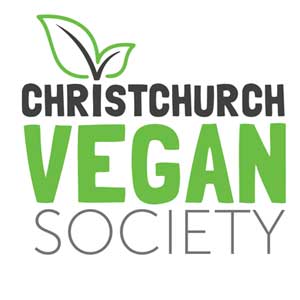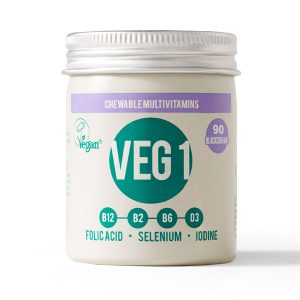
Introducing VEG 1
The vitamin supplement created for vegans, by vegans!
VEG 1 is the nutritional vitamin and mineral supplement developed by The Vegan Society in the United Kingdom.
Launched in 2005 and re-branded in 2021 with stunning plastic-free packaging, VEG 1 provides nutritional support alongside a healthy and balanced vegan diet, all for an affordable price.
VEG 1 provides a reliable source of vitamins B12, B2, B6, folic acid, vitamin D3, iodine and selenium.

Vitamin B12 (25µg – 1,000%) Vitamin D3 (20µg – 400%) Iodine (150µg – 100%) Selenium (60µg – 109%) Vitamin B2 (1.6mg -114%) Vitamin B6 (2mg – 143%) Folic Acid (200µg – 100%)
For more detailed information about each nutrient and why they were chosen to be included, go to the next FAQ ‘Why has VEG 1 been developed?’
Vitamin B12
Vitamin B12 is almost entirely absent from modern plant foods which are not contaminated by bacteria and insects. Even unwashed, organically grown plants do not contain a significant amount of B12. Vegans often have intakes of vitamin B12 well below recommended intakes. Low vitamin B12 intake by vegans routinely leads to reduced activity of some important enzymes and increased levels of homocysteine and methylmalonic acid (MMA). Even moderately elevated homocysteine is associated with increased risk of death, depression, stroke, dementia and birth defects, though it remains unclear how many of these associations reflect true cause and effect.
Vegans who do not get vitamin B12 from fortified food or supplements are at increased risk of clinical deficiency symptoms such as anaemia and nervous system damage. The most common early symptoms of vitamin B12 deficiency are tiredness (from anaemia), numbness and tingling (from nervous system damage) and sore tongue.
VEG 1 is designed to provide sufficient absorbed vitamin B12 to match national and international recommended intakes. It is designed to be chewed as this increases the reliability of vitamin B12 absorption by dispersing and dissolving the tablet.
Vitamin D
In the winter – whenever our shadows at midday are more than twice as long as we are – our skin cannot produce vitamin D effectively and even small dietary intakes may become important to avoid deficiency. VEG 1 aims to eliminate the disadvantage to vegans from low dietary vitamin D intakes. UK recommendations for vitamin D intakes are 8.5-10µg/day for infants less than 1 year old and 10µg/day for everyone else (µg = microgram; sometimes also written mcg).
Iodine and Selenium
Most plants have no requirement for iodine or selenium for their growth, so the amounts of these nutrients in plants vary widely and iodine and selenium intakes from vegan diets can be lower than from omnivorous diets. In the UK and many other countries dairy products are a major source of iodine due to the use of iodine-fortified feed concentrates. Iodine and selenium are also provided to some farmed animals as supplements. A moderate, steady iodine intake is ideal for thyroid health and low iodine intake during pregnancy impairs intelligence in children. Selenium is an important protective anti-oxidant.
Other nutrients
We also included small amounts of folic acid, vitamin B2 and vitamin B6 in VEG 1 as they work along with vitamin B12 to reduce homocysteine levels. Folic acid is especially important for women planning to conceive.
We did not attempt to include all nutrients as most nutrients are not an issue for vegans eating a varied and sensible diet. VEG 1 is intended to complement a healthy vegan diet and does not seek to provide a substitute for such a diet.
We believe that VEG 1 continues to meet a need not addressed by the general supplement market for a supplement designed to meet the particular needs of vegans as a complement to a varied and healthful diet. Formulating such a supplement and ensuring that it is produced to high standards is no trivial task. We hope that our members and the many other VEG 1 users will agree that we have created a good and reasonably priced product that meets a real need.
Fortified foods – many plant milks; some margarines/fat spreads, such as Pure; some nutritional yeast flakes, such as Engevita (blue pack only); fortified yeast extracts; fortified breakfast cereals – can provide a good alternative source of vitamin B12. If you are getting 3 µg or more of vitamin B12 per day from fortified foods then you are unlikely to need additional supplementary vitamin B12, though it is not harmful to get both.
Fortified foods also provide small amounts of vitamin D. More importantly, sun exposure when the sun is well above the horizon (at least above 30 degrees – your shadow less than twice as long as your height – and preferably higher, especially if your skin is dark) can build up healthy vitamin D stores in the body. The safest way of getting vitamin D from sun is to expose as much skin as you can for about half the time that would cause your skin to appear slightly redder a day later: always avoid sunburn.
Seaweed can be a major source of iodine, but it is difficult to ensure a stable moderate intake as the iodine contents of seaweeds vary considerably even within a single type of seaweed such as kelp. This variability also applies to typical kelp supplements. Highly variable intakes may actually be worse for the thyroid than steady marginally low intakes.
Iodised salt can provide an alternative source of iodine though there have been examples of poor quality control in this case as well, and it would not make sense to add more salt just to get iodine.
Brazil nuts are a good source of selenium as they grow in soil rich in selenium. About ten nuts a week provides a good intake. Don’t overdo it: too much selenium can be harmful.
The ideal way to use VEG 1 is to chew it during or immediately after a meal. The fat content of the meal may assist vitamin D absorption and the digestive process may give more consistent absorption of vitamin B12. Taking VEG 1 with a meal also minimises the effect of its sugar content on teeth.
Do not exceed recommended intake.
VEG 1 contains 0.625 grams (a sixth of a teaspoon) of sugar. Sugar is used because it provides a stable, palatable and chewable base for the tablets. These properties are important as chewing improves the reliability of vitamin B12 absorption and the supplement is intended for children as well as adults.
The only potential adverse effect of such a small amount of sugar would be to slightly increase risk of tooth decay and this can be minimised if VEG 1 is taken with or immediately after a meal.
We have looked at alternatives – including fruit extracts, stevia and xylitol –but have not found an equally satisfactory alternative. Fruit extracts were impractical due to instability. Stevia has a distinctive taste and there is a legal limit to the amount that can be used per kilo. To match the current sweetness level of VEG 1, we would need to exceed this. If xylitol is used at levels of over 10% of the total product weight the product has to carry the warning: “excessive consumption may cause laxative effects”.
Calcium intake can easily be low in vegan diets but this can be readily addressed by dietary choices, e.g. using fortified soy milks, calcium-set tofu and green leafy vegetables. Including calcium in VEG 1 would also conflict with palatability and chewability.
-
VEG 1 multivitamin
$29.95 Add to cart
- chewable multivitamin
- 3-month supply
- 100% vegan
- Easy and convenient
- Plastic-free packaging
- Taken once daily
- Gluten, wheat, yeast and lactose free
ORDER VEG 1 NOW

